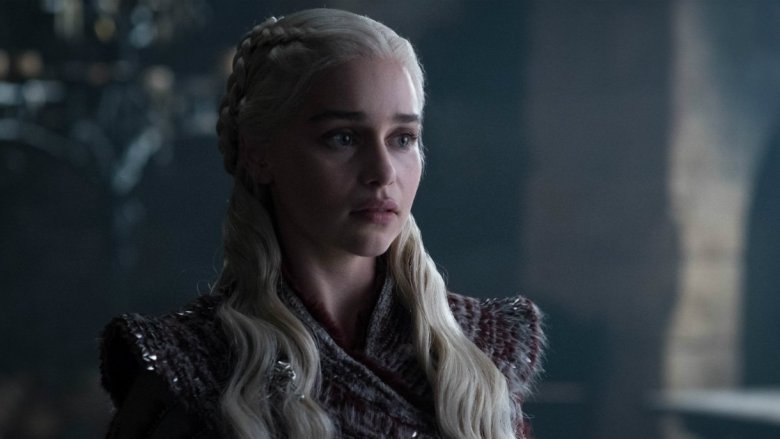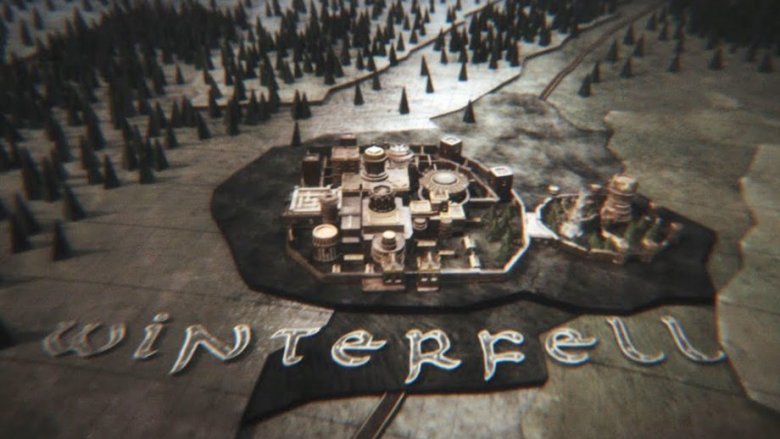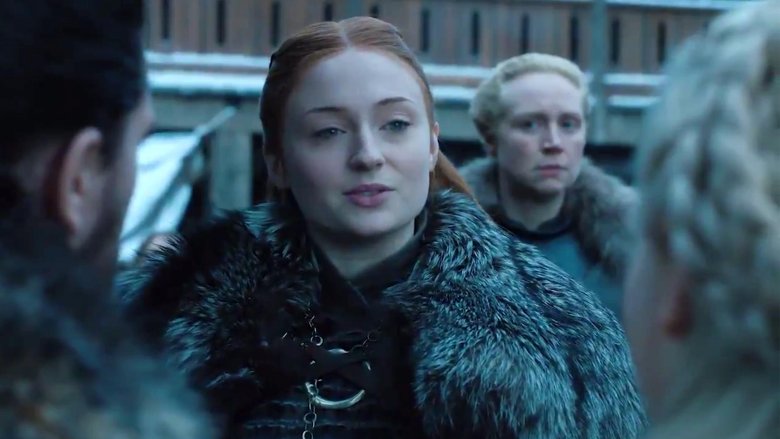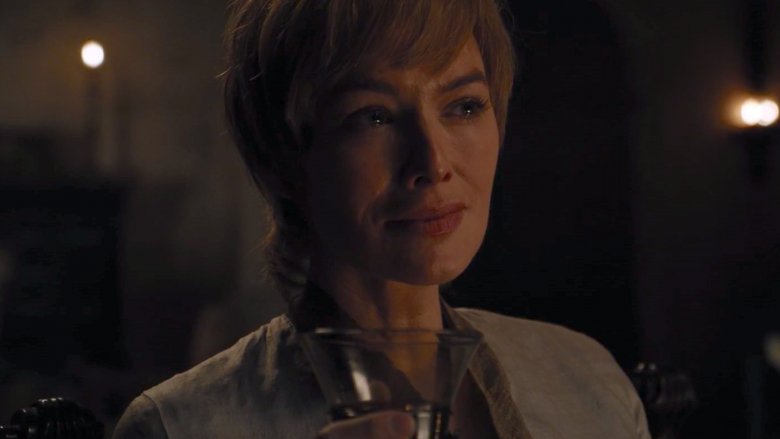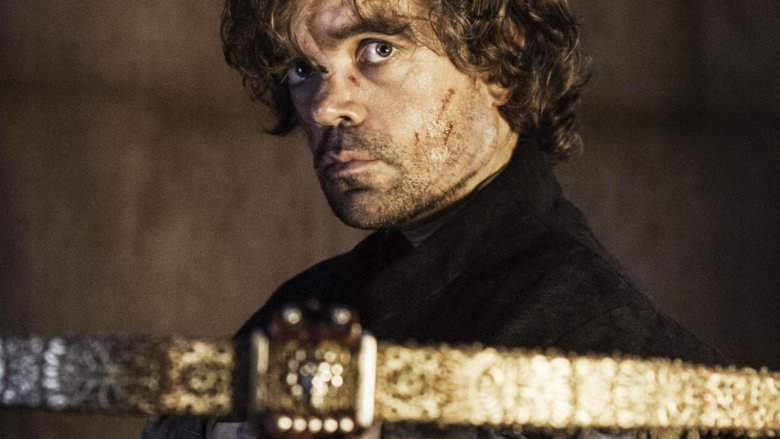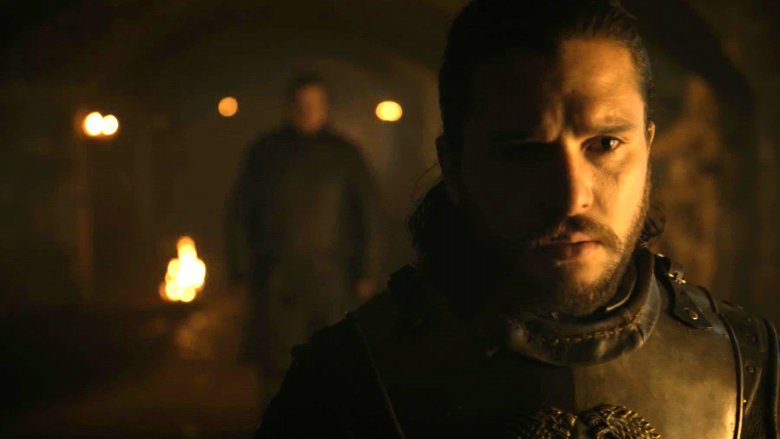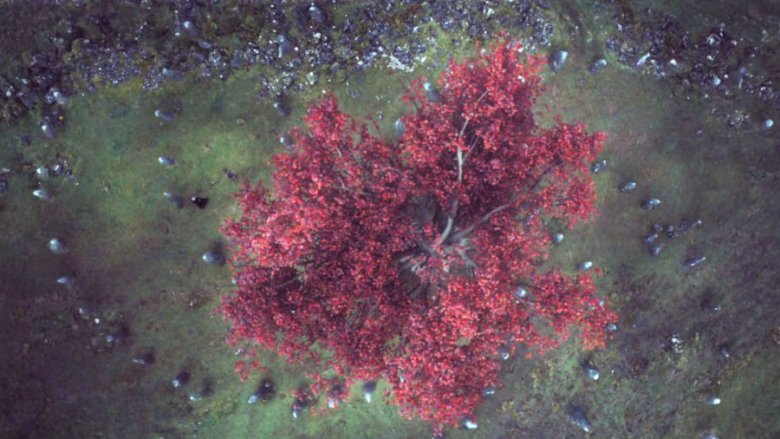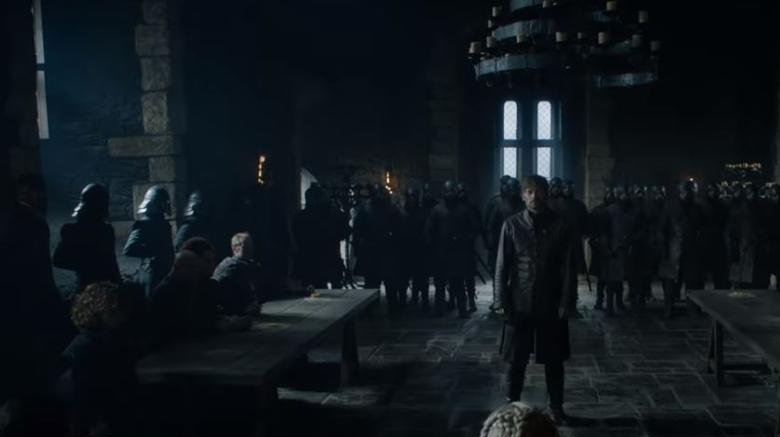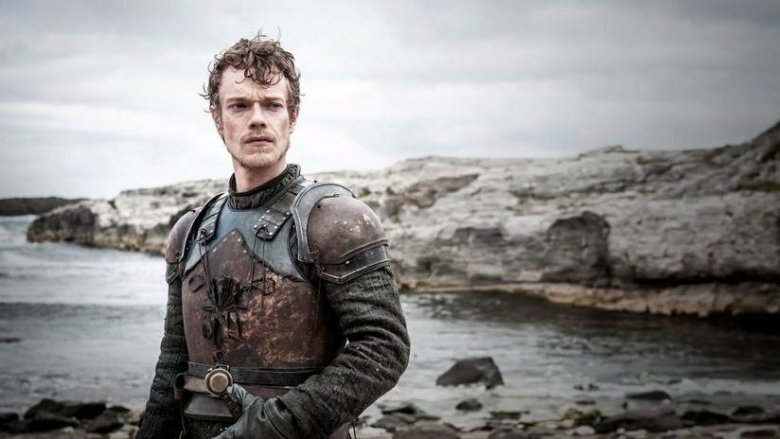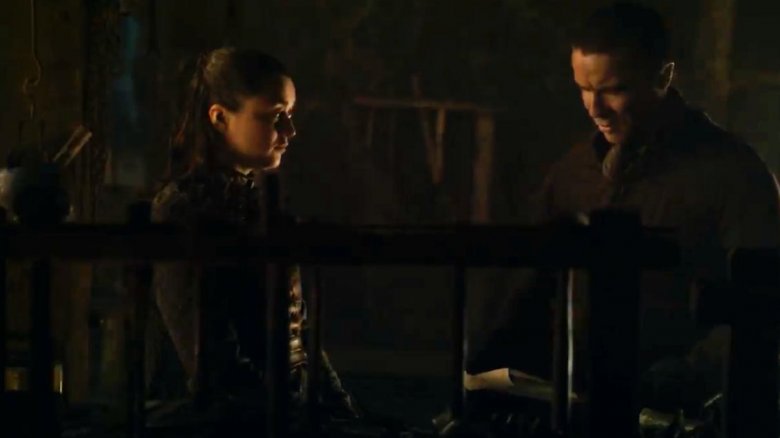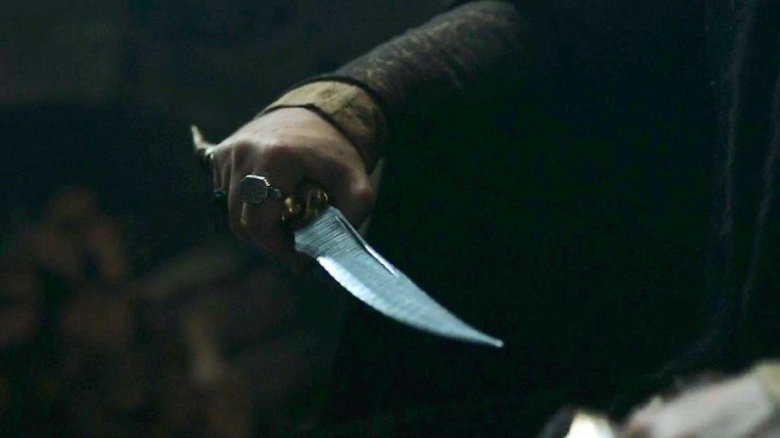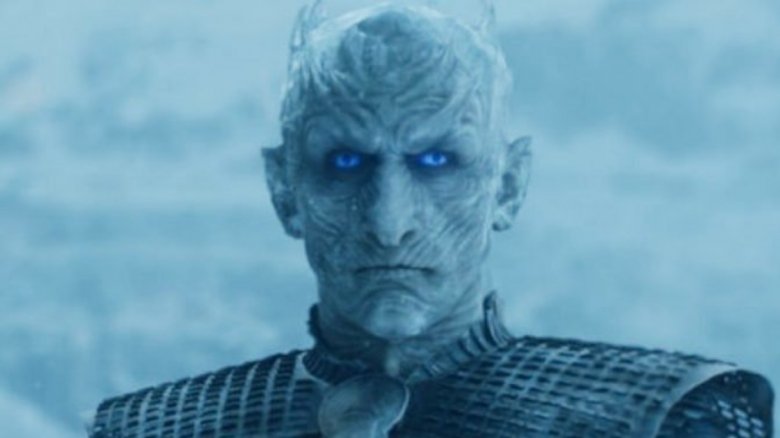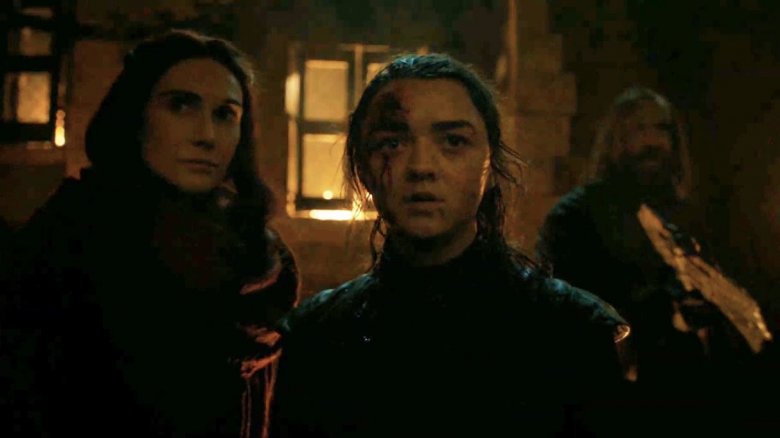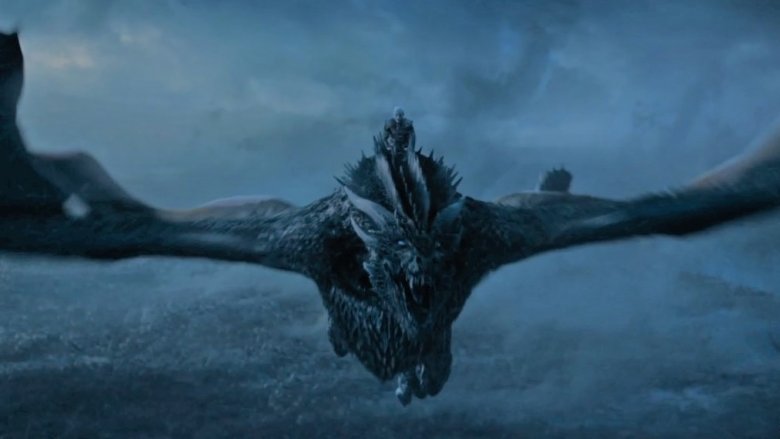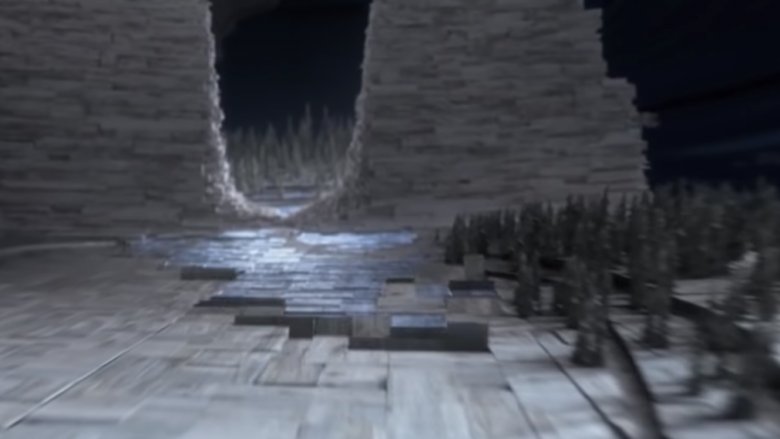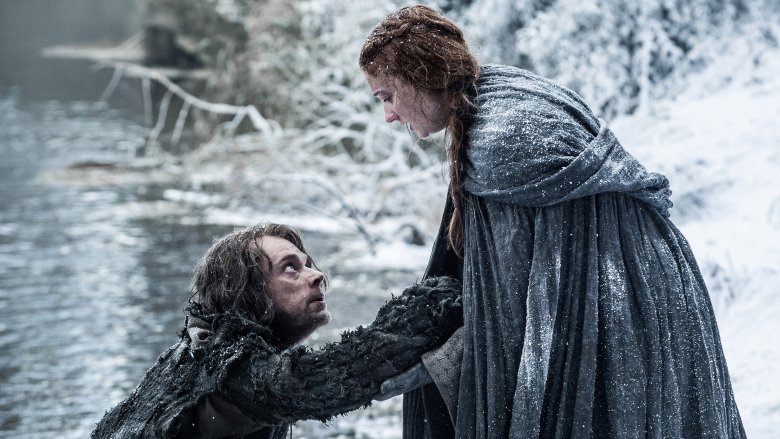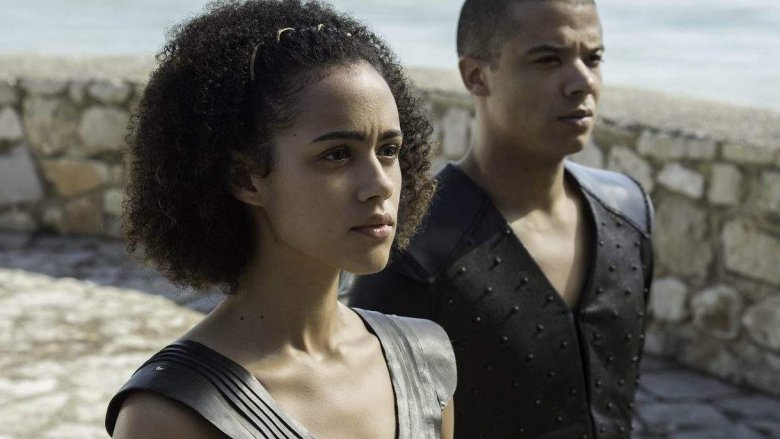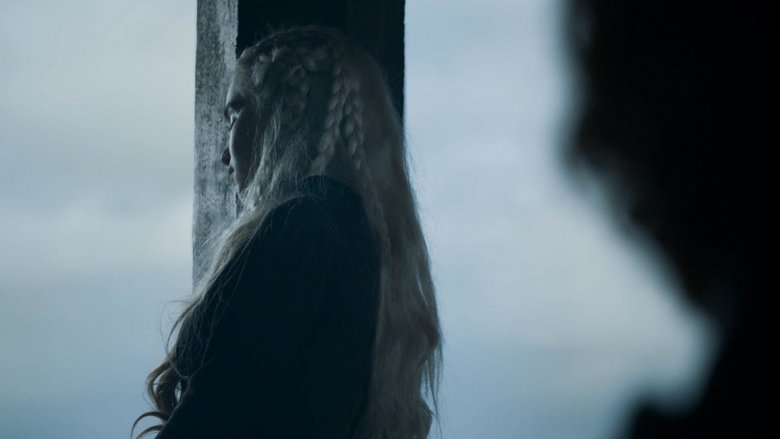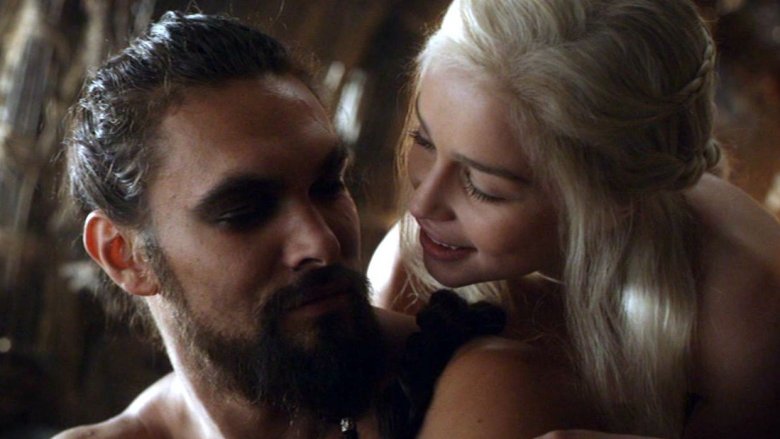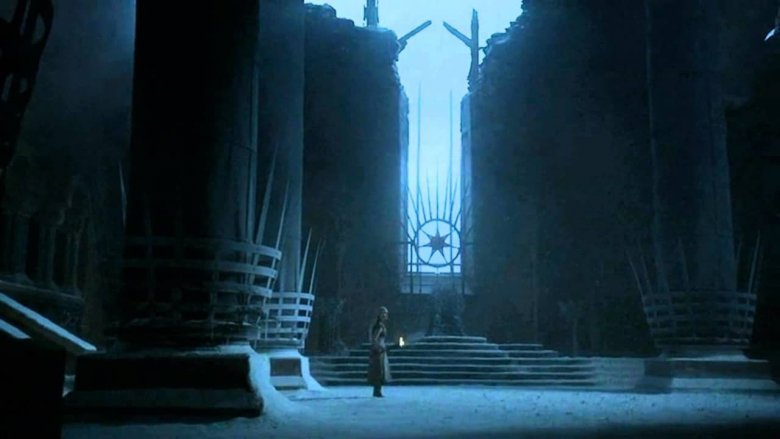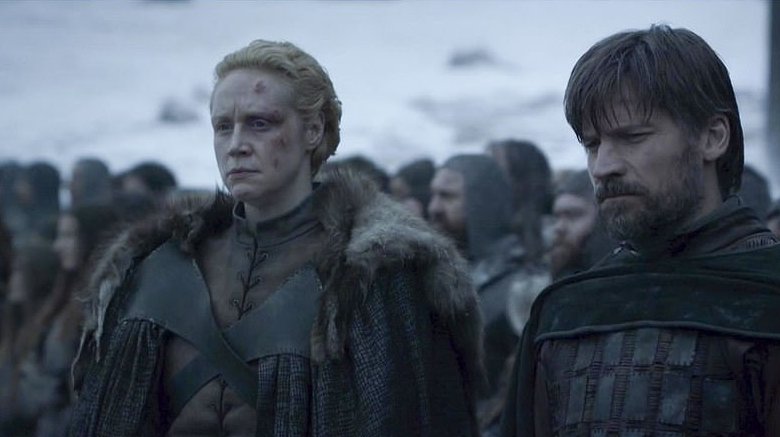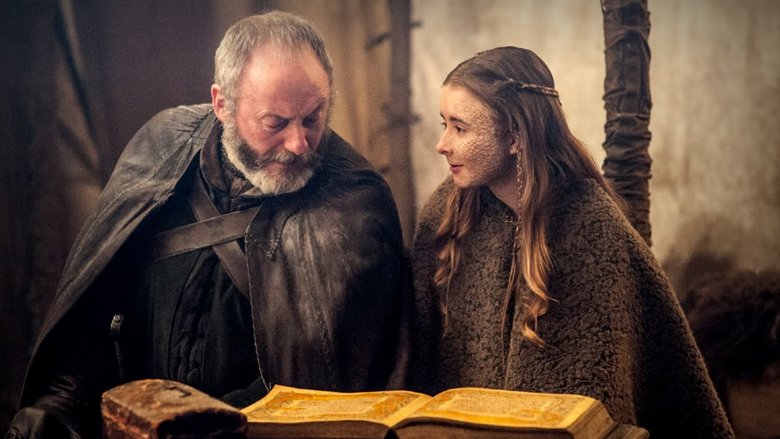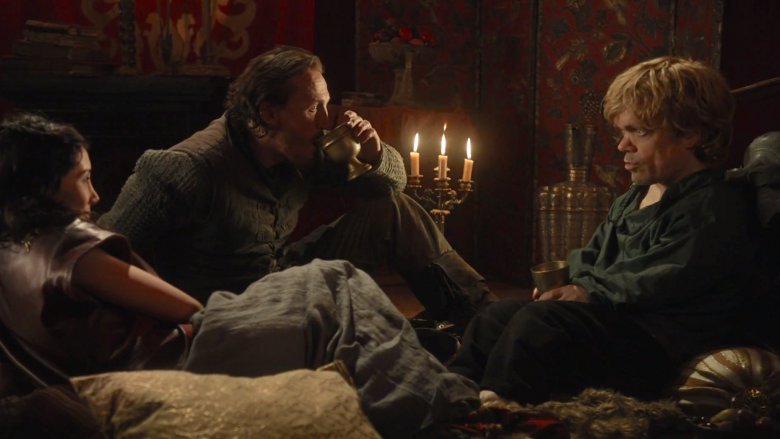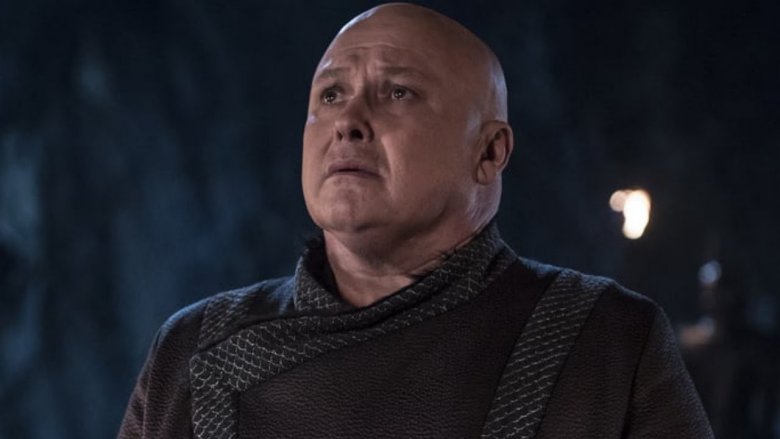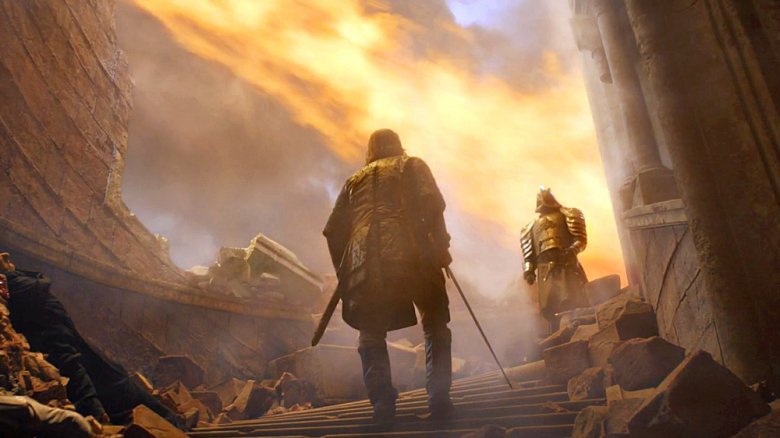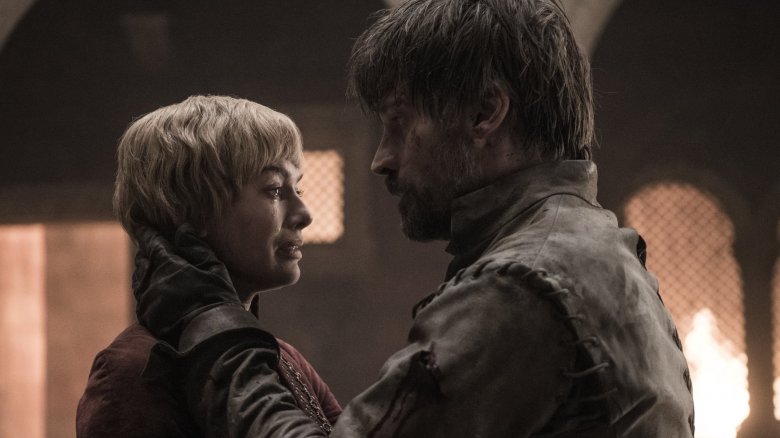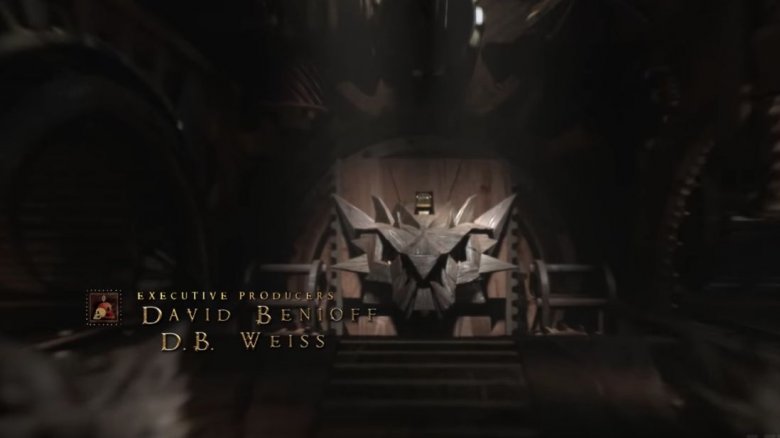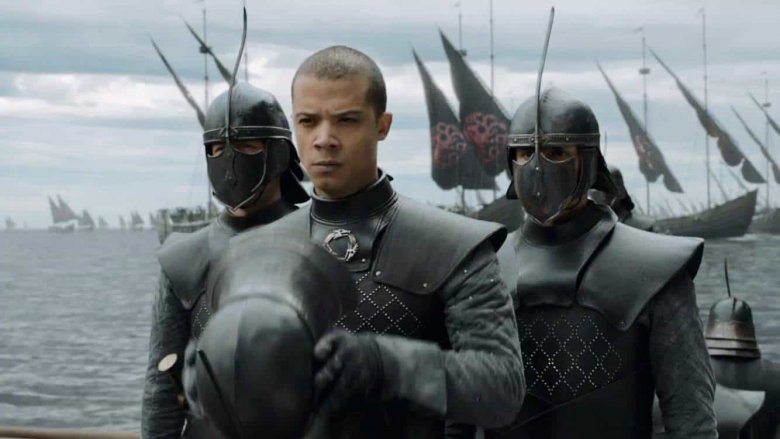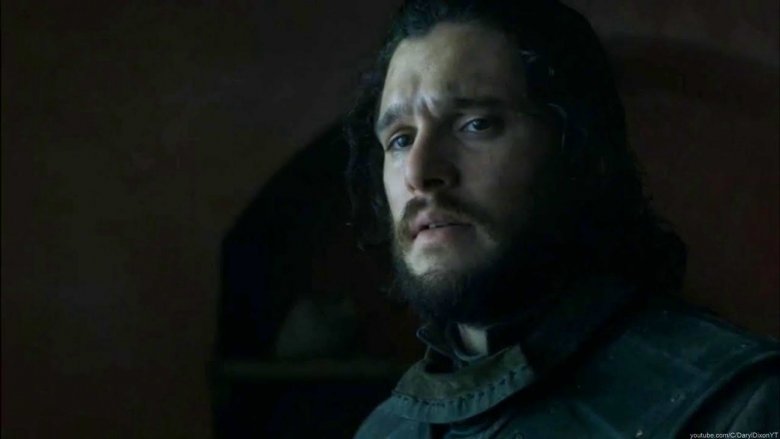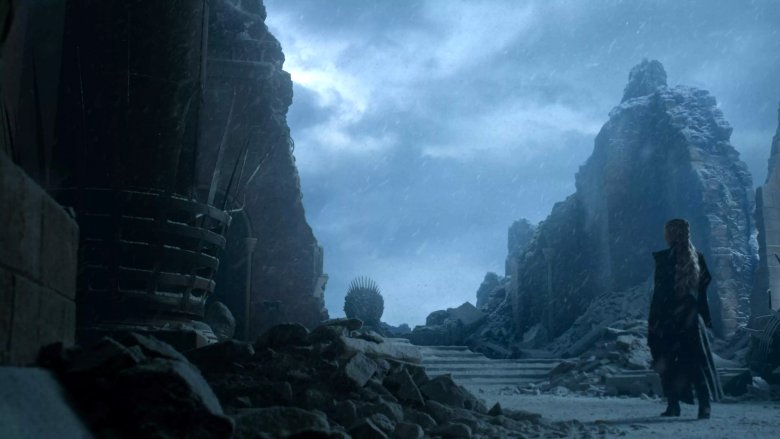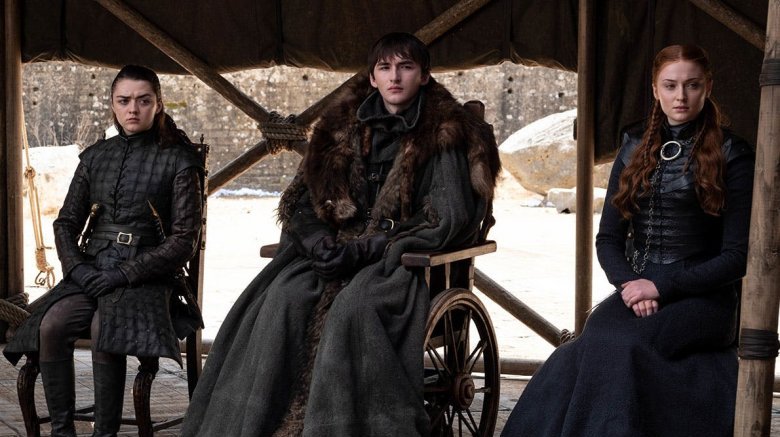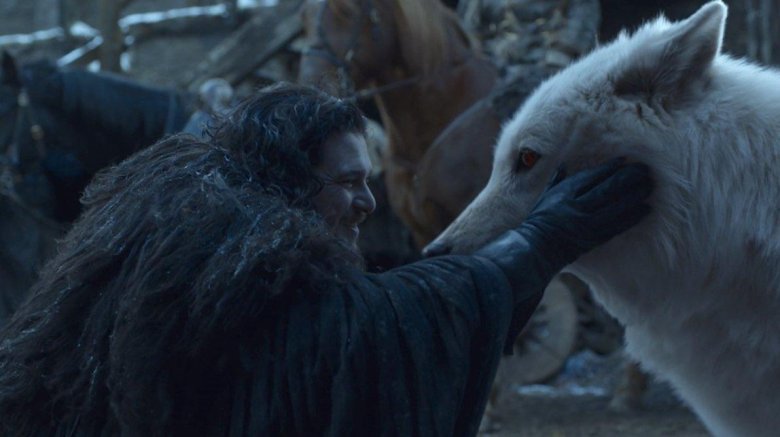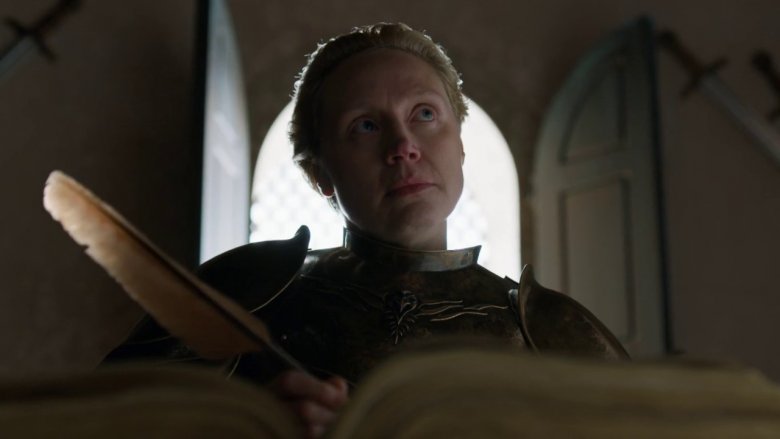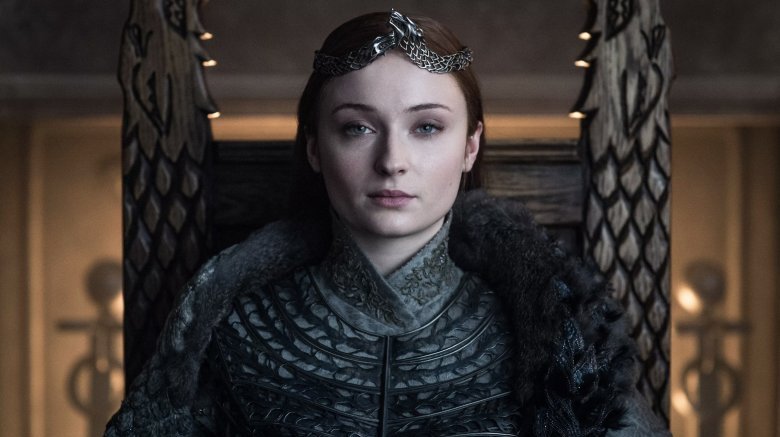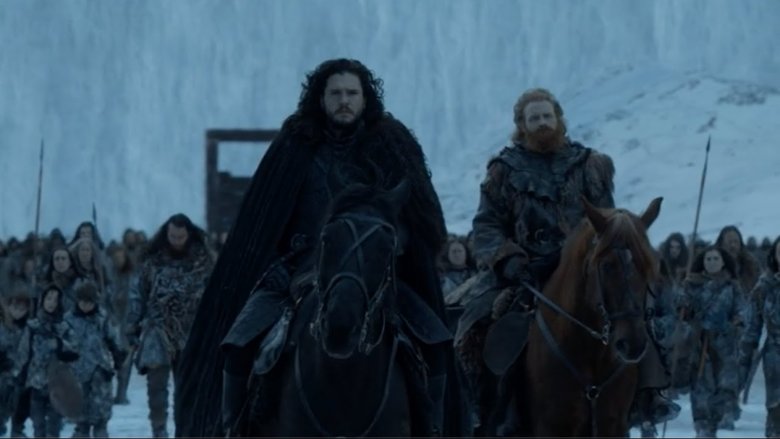Small Game Of Thrones Details You Missed In The Final Season
Game of Thrones fans have long since learned that they need to be constantly on high alert while watching — breaking down and dissecting every episode, looking for Easter eggs, callbacks, or clues as to how the show might end, whether the heroes will defeat the incoming threat of the White Walkers, and who, if anyone, might sit on the Iron Throne once all is said and done. The showrunners are equally aware of just how dense their series is, and are constantly laying tracks for fans to follow — and obsess over after finishing each episode.
Whether you're a diehard Thrones fan or a relatively casual viewer, it's still pretty fun to hunt for any clues you can find from episode to episode, and the eighth and final season will surely be no exception. Keep track of them all right here with this look at all the small Game of Thrones details you missed in the last batch of episodes.
New opening credits
One of the most unexpected moments of the eighth season premiere actually came in the show's intro, which features an entirely new credits sequence — though the theme song is the same, the 3D map animation has changed from the previous seven seasons, and though there were small changes from season to season, this is basically a full overhaul which offers plenty of Easter eggs.
First of all, the credits remind us that the Wall has been breached as it soars directly through the hole that Viserion — Daenerys' dragon who was turned into an undead ice dragon by the Night King at the end of the last season — and small tiles on the ground seem to indicate the White Walkers' progress throughout Westeros. The introduction has also added Last Hearth, an abandoned Northern castle formerly home to the Umber family, which was loyal to the Starks and has since been ravaged by the Walkers. There's still more to be found in these credits – images displayed on swords include past events like the Boltons and Lannisters teaming up to overcome the Starks — representing the Red Wedding — as well as an image of three dragons looking at a comet, which represents the Red Comet, said to fall when dragons appear.
The Northerners will be hard to crack
One of the first lines spoken in the episode is from Jon (Kit Harington) to Daenerys when, as they pass by several clearly disapproving Northerners, he tells her that they don't readily trust Southerners — clearly evident when it comes to Sansa (Sophie Turner), Jon's sister and the current Lady of Winterfell, who looks skeptical at best when faced with this new Dragon Queen. Daenerys doesn't exactly ingratiate herself with the Northerners throughout the episode, as they struggle to accept and remain hesitant to trust her, despite Jon's assurances.
There's plenty of foreshadowing here about how Daenerys and Jon will fare in the North once people learn more about their chosen king — not only was Jon Snow actually born in Dorne, but he's a highborn (and Southern) heir to the Iron Throne, making him a total outsider even though he seems like a Northerner through and through. Daenerys, meanwhile, was always going to face opposition, but as we see later in the season, her looming discovery of Jon's lineage ends up being one of several factors contributing to the loss of her moral compass.
Cersei's back on the juice
Last season, it seemed as if Cersei Lannister (Lena Headey) had something to live for again — after losing all three of her children to everything from poison to suicide, she finally pregnant again, even if it was with her twin brother Jaime's (Nikolaj Coster-Waldau) baby. With both Tyrion and Jaime in the know, it seemed like Cersei cared about someone other than herself once again — which, incest aside, was oddly comforting for many Thrones fans who were worried Cersei would go full sociopath.
However, in the season eight premiere, after refusing a glass of her favorite vice back in season 7, Cersei is comfortably sipping wine once again after her first night with Euron Greyjoy (Pilou Asbæk), and she looks visibly discomfited when Euron tells her he'll put a "prince in her belly," seeming almost tearful as he walks away. If Cersei was telling the truth about her pregnancy in the first place, it's possible something tragic has happened to the baby since audiences last saw her, but knowing Cersei, the more likely option is that she made the pregnancy up to try and convince her brothers to side with her. Either way, Cersei's glass of wine seems awfully significant, considering how heavily she usually hits the bottle.
That crossbow sure looks familiar
When Qyburn (Anton Lesser) interrupts Bronn (Jerome Flynn) at the brothel on behalf of the queen, viewers know it can only be for something pretty evil; naturally, Cersei's own personal Dr. Frankenstein doesn't disappoint. Ever since Cersei's brothers Jaime and Tyrion (Peter Dinklage) turned on her, she's sought revenge, and she and Qyburn think Bronn might be the man for the job — but audiences might want to take a second look at the weapon Qyburn gives Bronn after passing Cersei's wishes along.
The crossbow looks incredibly familiar, and that's because it is; among other uses, this is the weapon that Tyrion used to kill his father Tywin (Charles Dance) at the end of the show's fourth season. Qyburn even tells Bron that "[Cersei] has a keen sense of poetic justice," which seems like quite the understatement.
Inching toward the truth about Jon Snow
The truth about Jon Snow's parentage — that he isn't a Stark bastard at all, but the child of Lyanna Stark and Rhaegar Targaryen, whose secret but legal marriage makes him the true heir to the Iron Throne — is revealed to Jon at the end of the season's first episode, but there are plenty of clues leading up to it that only the most diehard fans might have noticed.
There are plenty of seemingly offhand comments about who Jon really "is" or has "become," including an accusation from young Lyanna Mormont (a formidable Lady of a Northern house, and named for Jon's real mother) that Jon left Winterfell as a King and that she isn't sure what he "is now," but the biggest precursor to Jon's big reveal is his ride atop a dragon. Only Targaryens can ride dragons, and Jon rides an especially significant one — while Daenerys takes her place atop Drogon, Jon is left to mount Rhaegal, named for his father. Finally, when Sam tells Jon about his real heritage, the two are right in front of Ned Stark's (Sean Bean) statue in Winterfell's crypts; the last time Jon saw Ned, the latter promised to tell Jon the truth about his mother, so it's particularly fitting that he finds out with Ned by his side.
Spiral patterns from the Walkers
When audiences finally get to check in on Tormund Giantsbane (Kristofer Hivju) and Beric Dondarrion (Richard Dormer), they're tracking the destruction that the White Walkers have left in their wake as the Walkers and their wights have traveled beyond the Wall, and they find a pretty disturbing message left by the Night King — the young Ned Umber, turned into a wight and pinned to a wall amidst severed limbs, who provides the first episode's best jump scare when he reawakens and has to be set aflame. One of the most distressing images in the series' recent memory, Umber's dead body is the center of a spiral pattern made up of body parts — and it isn't the first time audiences have seen this pattern.
The White Walkers have long been associated with spirals and circles, from arranging the body parts of their victims to their sacred place in the North where they turn babies into White Walkers and the cave drawings that Jon showed Daenerys in the seventh season. Perhaps most crucially, the spirals can be seen in the scene that showed the Children of the Forest creating the first Walker, suggesting that these shapes have more to do with the lore of the Walkers than viewers fully understand.
Jaime doesn't trust Daenerys
Jaime Lannister's return to Winterfell was fraught enough as it was, considering that last time he was there, he tried to murder a young Bran Stark (Isaac Hempstead-Wright) after Bran caught Jaime and his twin sister, Cersei, in a rather compromising position. Beyond that, he's guilty of murdering Daenerys' father when he was a member of Aerys II Targaryen's Kingsguard, earning him the moniker of "Kingslayer," so he doesn't receive a particularly warm welcome at Winterfell, even after his friend Brienne of Tarth vouches for his character.
Though he's granted a royal reprieve by the Mother of Dragons, once Jaime joins up with his brother, Tyrion, it's clear that he doesn't have a ton of faith in his new queen, and it's not difficult to figure out why. After Jaime's experience with Daenerys' father, who had an unflattering nickname of his own — "The Mad King" — it stands to reason that he would be hesitant to trust that particular monarch's daughter, especially considering that Daenerys has proven herself to be a little bit of a loose cannon at times as well.
Theon comes full circle
When audiences first met Theon Greyjoy (Alfie Allen) in the show's first season, he was a mere ward of the Stark family, and despite the fact that he wasn't a legitimate member of the family, he was still completely dismissive to Jon Snow, Ned Stark's apparent bastard, letting audiences know that perhaps Theon needed to be taken down several pegs. After years of emotional and physical torture, that has come to pass, leaving Theon a beaten and castrated man struggling to reclaim himself and his name and fight for a cause he believes in. After several years of terrible behavior, Theon has fully redeemed himself by saving Sansa's life and proving that he's willing to sacrifice himself to do the right thing.
Now, in the show's final season, Theon has returned to Winterfell to fight for the Starks, even though his sister, Yara, has set off to retake the Iron Islands and create a stronghold across the ocean so that Daenerys and her faction can flee if the army of the dead starts to overtake them (considering that, luckily, wights can't swim). In doing this, Theon's journey has come full circle — after starting out with the Starks before abandoning them, he has finally come home to stand with them one last time, completing the arc of one of the show's most troubled characters.
Arya's weapon
In the eighth season premiere, Arya, reunited with her favorite blacksmith Gendry in the forge at Winterfell, brings him an incredibly specific drawing of a weapon she would like made, specifying that she wants it to surpass anything he's created thus far. Gendry, an expert forger, seems baffled at this request for a spear that parts in two with dragonglass tips, which seems to be an ideal weapon to bring into the battle against the dead, considering that both wights and White Walkers are vulnerable to dragonglass.
By the time the season's second episode rolls around, Gendry has already completed Arya's new toy, handing over a lengthy spear made with dragonglass that Arya takes to immediately. It shouldn't be a surprise, since audiences have seen Arya work with this sort of weapon before. During her training at the House of Black and White, Arya trained using spear-like weapons, so it's no wonder that during the ultimate fight for survival, she would return to a weapon that she feels comfortable with, even though this consummate fighter, is well-versed in everything from archery to swordfighting.
We've seen Arya's dagger before
Beyond being a useful weapon against the Army of the Dead, it seemed as if the story of Arya's Valyrian steel dagger was already over. First seen in the show's second episode, when it was used in an attempt to murder Bran Stark after his fall from the tower, the dagger belonged to Petyr "Littlefinger" Baelish. From there, it stayed with Littlefinger until he gave it back to Bran, who gave it to Arya, who, naturally, used it to slaughter Littlefinger during his season 7 trial.
Arya has been holding onto the weapon since Littlefinger's execution, and since it's made of Valyrian steel — one of the only substances lethal to White Walkers — it certainly seemed that it would be helpful during the battle of Winterfell, but nobody could have anticipated just how useful it would be. During the episode's big climax, as the Night King makes his way towards Bran, Arya's training gives her the upper hand over the Walkers, letting her silently steal through the Godswood until she fights the Night King himself, destroying him with Littlefinger's dagger to save the brother who gave it to her. This knife has had quite the journey where Bran is concerned, so it seems oddly fitting that the weapon once intended to kill him is what saved not just him, but every human fighting at Winterfell.
The Night King has bad luck with weirwoods
Much like some of the characters he and his army slaughtered — like Theon, who died protecting the Starks, or Jorah Mormont (Iain Glen) dying to protect his beloved Khaleesi — the Night King came full circle before meeting his dramatic demise at Arya's hands. During season 6, viewers discovered exactly how the Night King came to be thanks to one of Bran's visions: he was created by the Children of the Forest, some of the first residents of Westeros. The Children, who were being slowly invaded by the First Men (who saw fit to cut down sacred weirwood trees), decided to fight back by taking one of the First Men captive and piercing him with dragonglass, thereby creating the Night King and wreaking havoc on Westeros and its inhabitants for generations to come.
With all that in mind, it's perfectly fitting that the Night King met his end right back where he started — in front of a sacred weirwood tree. Located in Winterfell's godswood, this mythical tree serves as a representation of the Old Gods, and was seen as religious relics by the Children of the Forest. It seems as if, either way, he didn't have great luck where weirwoods were concerned.
Some characters served their 'purpose'
We don't have a ton of concrete information about the mysterious "Lord of Light," but a few characters have always taken him pretty seriously — particularly Melisandre (Carice van Houten) and Beric Dondarrion (Richard Dormer). As a Red Priestess and the leader of the Brotherhood Without Banners, these two adhered to the Lord of Light's teachings, and it's clear why. Beric, for his part, was brought back to life numerous times by his resident Red Priest, Thoros of Myr (who died beyond the wall in season 7), and Melisandre, besides having seemingly eternal life thanks to some nifty magic jewelry, was also able to revive the dead, notably bringing a stabbed Jon Snow back to life in season 6.
One of the beliefs mentioned most frequently by both Melisandre and Beric is the idea that everyone has a purpose, and in the battle at Winterfell, both characters fulfilled theirs by protecting Arya, who turned out to be the key to defeating the Night King. Melisandre roused the young warrior with a prophetic pep talk when all seemed lost, as well as showing off some cool fire tricks, and Beric sacrificed himself to give Arya a head start against some wights. They might have lost their lives, but it seems that somehow, both Beric and Melisandre knew their only job was to protect Arya, and they were ultimately successful — as was she.
Viserion is lost forever
After Jon Snow defeated a high-ranking White Walker, it became clear to the army at Winterfell that all they had to do was get to the Night King, and that would destroy every wight and White Walker alike, since taking down the creator also takes down all of his creations. Eventually, Arya found her way through the Godswood to deliver the final blow to the Night King, turning both him and his creations into dusty shards of ice (as if the world at large didn't have enough dusting sequences during the last weekend of April in 2019). Just as the heroes at Winterfell seem to think everything is lost, their enemies literally fell to pieces — the largest of which being Viserion, Daenerys' lost dragon who was slain and resurrected by the Night King in season 7.
After Viserion was turned, many viewers hoped against hope that he could still be saved, returning to his former glory and pairing him back up with Daenerys' other "children," Drogon and Rhaegal. Unfortunately, "The Long Night" confirmed the worst: Viserion, officially a creation of the Night King, would be one of the sacrifices the heroes had to face to win the war.
The tiles have stopped moving
When Game of Thrones debuted a new title sequence with the start of its eighth season, viewers spent hours scanning the animation for clues and Easter eggs. From swords depicting major events like the Red Wedding to sequences showing off the new lines of defense at Winterfell and King's Landing, there was plenty to investigate, and they dug deep into every facet of these new credits for hints about how the show might end and who might eventually triumph.
One of the most interesting aspects of the new sequence were the moving tiles, which represented the oncoming threat of the White Walkers and their army as they found their way through the enormous hole in the Wall and into Westeros. By the end of the first episode, they were located somewhere near Lasthearth, which ended up being the first casualty of the Great War within Westeros, and as the Battle of Winterfell approached, more tiles flipped to show that the Army of the Dead was encroaching on the biggest Northern stronghold. Now, in the aftermath of the Night King's downfall, the tiles have stopped flipping, indicating that the White Walkers might just be done for after all.
Sansa chooses a new Stark
Theon Greyjoy experienced one of the most complicated and difficult character arcs in all of Thrones, evolving from a spoiled ward of the Starks to a broken man who suffered through years of torture and emotional abuse. After escaping Ramsay Bolton's clutches, Theon regained his honor somewhat, saving his sister Yara from her captivity at the hands of their sinister cousin Euron as well as returning to fight for the Starks in the Battle of Winterfell.
As the remaining humans at Winterfell bury their dead during the aftermath of this epic battle, several high-ranking lords and ladies step forward to light funeral pyres for those they loved, respected, fought with, and lost, and in one of the first shots of episode 4, Sansa weeps over Theon's body. It's no wonder that she feels his loss deeply, especially since Theon is the reason Sansa escaped and survived Ramsay Bolton, but her final gesture to him is one of the most touching moments of the show: she quietly removes her Stark pin and affixes it to his coat. In his last moments before cremation, Sansa tells Theon he really is a Stark, and says goodbye to a troubled but beloved member of her family.
Cersei comes full circle
Cersei spent the Battle of Winterfell waiting out her enemies, so when they finally arrive at King's Landing to try to force her surrender, she's ready to strike — and she has a captive with which to taunt them. After her assault on Daenerys' ships near Dragonstone, Cersei has been holding Missandei, Daenerys' translator, confidante, and best friend hostage, and it's immediately clear that Cersei will use Missandei however she has to in order to achieve her bottom line.
In a brutal display of power, Cersei orders the beheading of poor Missandei, who gives her life willingly for her chosen queen, bravely standing in support the woman who freed her from her chains. However, Cersei's decision to decapitate Missandei may have larger consequences than she realized — the last time a blonde Lannister ruler vindictively cut off someone's head to prove a point, it was Joffrey ordering Ned Stark's execution, which started a land war. Cersei has basically become her sadistic son, and it's only a matter of time before she crumbles and falls, just like he did.
Daenerys' braids in disarray
Since the beginning of the show, Daenerys has adopted different traditions and styles from the different tribes and groups she's led and joined, and perhaps the most influential group in her young life is the Dothraki, thanks to the fact that she became a queen of the warrior tribe upon her marriage to Khal Drogo (future Aquaman Jason Momoa). The Dothraki place an enormous importance upon the length and style of their hair, especially for the men – the more braids a man sports, the more victories he's won in battle, and a Dothraki warrior only cuts his hair if he loses a fight, so the longer the mane, the more formidable the warrior.
As such, Daenerys has sported a lengthy mane featuring a fierce tangle of braids for several seasons, but the fifth episode of the eighth season finds her at a disadvantage, having lost two of her most trusted advisors, Missandei and Jorah. When Tyrion checks on her at Dragonstone, her braids are mussed, undone, and ragged, letting audiences know that the Dragon Queen is losing her grip, and will end up risking everything to get back on top.
Drogo's promise
When Daenerys was married to the warrior lord Khal Drogo in Thrones' first season, she didn't anticipate having to fight all of her own battles, mostly because Drogo, a prideful and formidable fighter, was all too happy to wage war on her behalf. When Daenerys told him she was pregnant with his son, who was prophesied to be a Messiah-like figure known as the "Stallion Who Would Mount the World," Drogo made a passionate promise to take the Iron Throne on Daenerys' behalf, swearing that he would kill everyone who stood in her way, tear down their stone houses, and rape and pillage their villages.
Daenerys made a similar promise to the Dothraki in the show's sixth season (minus the rape part, thankfully), but it seemed unlikely that she would be this brutal with her attack — however, once the eighth season arrived, Daenerys had become far more ruthless, and from the destroyed stone houses to the dead soldiers in their "iron suits," it certainly seems as if Daenerys fulfilled Drogo's promise, for better or for worse.
A vision of the Iron Throne
After losing her husband, Daenerys made several attempts to find armies and benefactors to back her in the war to come, and during Thrones' second season, she ran afoul of the warlocks of Qarth, who stole her dragons and lured her into the terrifying and mystical House of the Undying to get them back. Naturally, Daenerys charged into the temple to track down her "children" and experienced a number of visions along the way, seeing everything from her late husband Drogo and their child (whom she also lost) to a battered and seemingly destroyed Iron Throne.
Standing in an empty and ravaged Throne Room, it seems as if Daenerys is surrounded by snow, but thanks to the aftermath of King's Landing in the wake of her ruthless and murderous siege, it's clear that her vision has come true — and it's not snow, but ashes. Viewers always believed that the snow was a sign of the Night King, but perhaps, at this point, Daenerys' reign of fire and blood is even more dangerous and destructive than the Night King himself.
Ned's sword defends Winterfell
As one of the only substances that can destroy a White Walker, Valyrian steel can be tough to come by; as a result, only a small handful of characters on Thrones are in possession of weapons made out of it. One of those characters was Ned Stark, longtime Warden of the North and Lord of Winterfell and (literally) short-lived Hand of the King to Robert Baratheon. After the honorable but naïve Ned figured out that Robert's son Joffrey wasn't Robert's biological son, but the product of incest between Cersei and Jaime, he ended up losing his head, and his Valyrian steel sword, Ice, was melted down and remade into two new blades.
The first, christened Widow's Wail by Joffrey, was barely used before Joffrey met his own untimely end (at his own wedding, no less) and ended up with his uncle-father, Jaime; the second, Oathkeeper, was gifted to Brienne of Tarth (Gwendoline Christie). Though Jaime and Brienne spent some time on opposing sides of the conflict between the Lannisters and the North, they joined forces again during the Battle of Winterfell, and as they fought side by side, the two parts of Ned Stark's sword came together once again to defend the Starks' house, which feels perfectly fitting.
Remembering Shireen
Davos Seaworth (Liam Cunningham) might seem prickly at times, but his soft side always showed around Shireen Baratheon (Kerry Ingram), the royal daughter to the late Stannis Baratheon. Though Shireen was afflicted by greyscale as a baby, healers were able to stop the progression of this dangerous disease, but she still bore its scars on her face, making her somewhat of an outcast. This bonds her to Davos, especially when he's imprisoned by Stannis for turning against his king; while he's in captivity, Shireen teaches Davos how to read. The two end up forming a real bond, and when Davos leaves Stannis' camp, only to discover later that Shireen has been sacrificed by Melisandre to help Stannis' cause, he's understandably devastated.
Davos never really recovers from Shireen's death, so it's easy to see why, as Winterfell prepares for its battle against the Army of the Dead, he and Gilly (Hannah Murray) are particularly struck by a young, brave girl with a scarred face who says she wants to fight alongside the soldiers rather than stay down in the crypts (Shireen also taught Gilly how to read). To drive the emotional point home, music associated with Shireen even plays over the scene, to remind viewers of the young princess and her tragic, untimely end.
Tyrion's first wife
In the aftermath of the Battle of Winterfell, those who fought for the North spend their night enjoying a well-earned celebration, and with that comes the return of one of Tyrion's favorite pastimes — his drinking game, which is sort of a cross between "two truths and a lie" and "never have I ever," in which players guess truths about their fellow drinkers. Audiences first saw Tyrion play this in season one on the eve of another battle, when he plays with Bronn and Tyrion's lover, Shae (Sibel Kekilli) before going against Robb Stark's forces the next morning. During that first game, Tyrion reveals a horrifying truth about his first marriage, which is that he fell in love with and married a prostitute named Tysha, who was hired by Jaime for Tyrion's pleasure. When his father Tywin (Charles Dance) found out, he passed Tysha around throughout his army and forced Tyrion to watch.
Fast forward years later to Winterfell, when Brienne correctly guesses that Tyrion was married before Sansa, which leads to a dark look on Tyrion's face (and is perhaps what goads him into taunting Brienne about her virginity). Tyrion ended up exacting his revenge on his father, killing both him and Shae (who betrayed him), but the memory still clearly stings, for obvious reasons.
Varys is trying to poison Daenerys
With a nickname like Master of Whispers, it's no surprise that Lord Varys (Conleth Hill), also known as "the Spider," trafficks in secrets, and he continues to do so right up until the very end of his life. Though he began Thrones firmly in the Lannister camp, he switched allegiances after helping Tyrion escape execution in King's Landing, backing Daenerys and Tyrion, though not without reservations. Having spent time with Daenerys' father the Mad King, he's understandably wary of the Dragon Queen's quick temper and stubborn attitude, and he clearly has a few failsafes in place.
Varys doesn't plot against Daenerys for long before he's taken to the beaches of Dragonstone and executed by her largest dragon, Drogon, during Thrones' penultimate episode, but it's clear he has some nefarious plans underway before he's caught. Not only is it very likely that he managed to get a message to someone else about Jon Snow's true heritage (which directly challenges Daenerys' claim to the Iron Throne), he also has a cryptic conversation with a servant girl about the fact that Daenerys isn't eating. In hindsight, this is pretty clearly a reference to one of Varys' plans — before he dies, he's trying to poison Daenerys before she can follow in her father's footsteps.
The Mountain's signature move
Since his trial by combat against Oberyn Martell (Pedro Pascal), Gregor Clegane, known as "The Mountain" (played by a series of actors that culminated in bodybuilder Hafþór Júlíus Björnsson) has dubiously stuck around thanks to some sketchy "healing" by Qyburn (Anton Lesser), Cersei's personal Dr. Frankenstein. Despite being stabbed with a poisoned spear repeatedly during the battle, the Mountain managed to knock Oberyn down one last time and take him out, squeezing his head and eyes until his head exploded in one of Thrones' most gruesome deaths; since then, the Mountain has "lived" as a kind of silent zombie, who lives to serve at Cersei's side.
Even though the Mountain seemed flat out unkillable, it didn't mean his younger brother Sandor, known as the Hound (played by Rory McCann) wasn't going to try, which led up to CleganeBowl, a long-anticipated showdown between the two dangerous brothers. The Hound tries his hardest, but no sword wound can take down his undead brother, and all hope seems lost when the Mountain brings back his signature move, pressing his thumbs into his brother's eyes and nearly blinding him. However, this time, his move doesn't guarantee victory; the Hound overcomes his fear of fire and sends them both tumbling over the ramparts of the Red Keep, in a fitting end for the dueling Clegane brothers.
Jaime got his wish
Jaime Lannister has his ups and downs throughout Thrones, from trying to kill a child to protect his incestuous relationship to saving Brienne of Tarth from certain death in a bear pit, but despite his journey, it turns out the Golden Lion always had a singular goal, which he expressed to Bronn in the show's fifth season. Discussing how they'd like to die, Jaime says he wants to "die in the arms of the woman [he loves]," prompting Bronn to ask if "she" wants the same thing, a question Jaime doesn't answer.
Fans were led to believe that Jaime had finally left his first love, Cersei, after abandoning her and their unborn child at the end of the seventh season, and perhaps even found a new love in Brienne of Tarth, but in the end, he returns to Cersei's side, dying in her arms in the ruins of the Red Keep as Daenerys lays waste to the city. This character turn was pretty unpopular with fans, but at least Jaime got his wish in the end.
King's Landing is broken
Starting with the beginning of season eight, the opening credits changed from episode to episode — in the past, where the credits showed viewers each major location that would figure prominently into that season's throughline, season eight offered up tons of new developments from installment to installment. For example, while the White Walkers were still a threat, tiles flipped over to indicate their progress south of the Wall; as the season began, the titles took audiences through the defenses and ramparts of both King's Landing and Winterfell, the two most important locations during the show's final conflict between the North and the South.
Before the season finale even opens on the wreckage of King's Landing after Daenerys' siege, the opening credits serve as a reminder that the city is completely ruined — cogs of machinery that once ran smoothly are jammed and broken, and nearly everything is depicted as useless rubble, letting viewers know that King's Landing is still in a state of catastrophic disrepair.
Grey Worm has come full circle
When fans meet Grey Worm, he's the leader of the enslaved Unsullied army, a formidable battalion made up of castrated men trained to fight from birth and forced to commit unspeakable acts to prove their stoicism, bravery, and talent. Advertised as warriors to whom "death means nothing," who feel no fear and will fight tirelessly to whomever they are pledged, the Unsullied serve as a powerful army, but live in captivity until they are rescued by Daenerys in Astapor and asked to serve her as free men.
As the chosen leader of the Unsullied, Grey Worm becomes one of Daenerys' most faithful and trusted advisors, learning to liberate and love alongside the Mother of Dragons and even starting a relationship with Missandei, another freed slave working with Daenerys. However, in the aftermath of Missandei's murder, Grey Worm seems like a broken man, and during and after the gruesome Battle of King's Landing, he seems to relish murdering defeated Lannister soldiers after Dany orders him to do so. Daenerys proclaims herself and Grey Worm to be liberators, but it seems as if Grey Worm's chains are still a part of him.
Tyrion invokes Jon's vows
Once Tyrion is locked up for the twin offenses of freeing his brother Jaime from captivity and quitting his job as Daenerys' Hand of the Queen, he knows the only person who can possibly help him is Jon Snow — who, despite his love for Daenerys, can usually be counted on to do the right thing, even when it feels all but impossible. This time, the right thing is a tougher task than usual — Tyrion wants Jon to kill Daenerys, who has revealed herself as the power-hungry successor to her father the Mad King, and will stop at nothing in her quest to conquer and control every part of the Seven Kingdoms (including Jon's beloved Winterfell).
In order to fully convince Jon that murdering his aunt/lover is the only way forward, Tyrion takes advantage of Jon's sense of honor and duty, going so far as to quote his original Night's Watch vows to remind Jon that he is "the shield that guards the realm of men." Especially considering that Jon ends up banished to the Night's Watch for life thanks to his decision, this move feels fitting.
Daenerys never even sits on the throne
After eight seasons of long journeys, intense battles, and thousands of lives, Daenerys finally accomplishes the goal she's had since the show's first season, and lives out the vision she experienced in the House of the Undying. After she rallies her armies to keep liberating the Seven Kingdoms from tyranny, she makes her way to the Throne Room and, for the first time in her life, sees the Iron Throne.
However, before Daenerys can even sit on it (she does reach out and touch it), she's interrupted by her nephew-boyfriend Jon Snow, who gives her one last chance to return to sanity and redeem herself for the destruction of King's Landing before he kisses her goodbye and stabs her, killing her for the good of the Realm. Drogon's reaction to his mother's death is to torch the Iron Throne into a puddle, so not only did Daenerys never take her place upon it, but now, nobody ever will.
The return of some familiar faces
After Jon takes Daenerys down for the good of the Seven Kingdoms and faces imprisonment, a council made up of the last remaining representatives of Westeros' great houses assembles in the dragon pit at King's Landing, and it has plenty of familiar faces — including the three Stark children along with Davos, Gendry, Brienne, and Yara Greyjoy — along with few faces viewers might have forgotten about entirely and a handful of unnamed characters.
Among those faces are Edmure Tully (Tobias Menzies), maternal uncle to Sansa, Arya, and Bran, who was last seen as a captive at Riverrun helping Jaime Lannister retake the castle — and true to form, Edmure immediately embarrasses himself and his nieces and nephew by making an ill-advised bid for the throne (Sansa steps in before he can get very far). Some viewers might have been pretty surprised to see Robin Arryn (Lino Facioli), Lord of the Vale and known late-stage breastfeeder, all grown up next to Yohn Royce, who has counseled Robin and Sansa before. Aside from them, there are several unidentified members of their council, but their outfits might give them away; aside from a few Northerners and a man who likely now represents Highgarden, we see the mysterious new Dornish prince and even a figure who might be Howland Reed, an old friend of the Stark family.
A Targaryen is back at the wall
It might seem counterintuitive to banish Jon back to the Wall, where he began his journey in the first season under the tutelage of Ned's brother Benjen Stark, especially considering that there isn't much need for a Night's Watch now that the Army of Dead has been defeated and the wildlings are at peace with the citizens of Westeros. However, Jon's place in the Northern territories is more symbolic than most might realize.
One of the show's biggest revelations was that Jon is actually a Targaryen, and even though this didn't ultimately come into play regarding who would take the Iron Throne, it's another connection between Jon and Aemon Targaryen, the Maester who resided at the Night's Watch and passed away in the show's fifth season. One of the only characters on the show to die a peaceful death from old age, Aemon might seem like a simple, bookish man, but in reality, he turned down the Iron Throne so he could never be used as a pawn against his brother Aegon. Even though Jon killed Daenerys to save the realm, he also didn't want the Throne, and it's easy to imagine that, under different circumstances, he would have made the same choice Aemon did — however, it's close enough that he finds himself at the Wall just like his old friend and once-secret relative.
Brienne's new role
Recently named as the first female Knight of the Seven Kingdoms by her brief lover and longtime comrade Jaime Lannister, Ser Brienne of Tarth has been one of the most staunchly loyal characters since her introduction in season 2. Brienne spends most of the show pledged to Sansa and Arya Stark, even when that means teaming up with the Kingslayer himself (who also promised to return the two girls to their mother, though neither Jaime nor Brienne was actually able to keep that promise). Initially wary of Jaime and his ridiculously cocky attitude, Brienne sees behind the Kingslayer's veneer after he loses his hand, and the two share a mutual respect (and attraction).
Brienne's most important moment in the finale speaks not only to her deep love for Jaime, but her recent promotion. Not only is Brienne the only female Ser in Westeros, she has also risen to Jaime's former job as Lord Commander of the Kingsguard, as indicated by her armor as well as the fact that she has taken over the job of editing the White Book, which records every deed performed by every Kingsguard member in history. Brienne lovingly finishes Jaime's entry, noting that he "died protecting his queen." Not only has Brienne taken Jaime's role as one of the highest-ranking knights in the Seven Kingdoms, but she's also protecting his history.
Sansa's coronation outfit
Some of Game of Thrones' finest details have been hidden in its incredibly intricate and detailed costumes, and from Jon's return to his Northern garb and Daenerys' post-battle leather suit and chain, the finale certainly didn't disappoint. However, the most impressive number of costume-based Easter eggs goes to Sansa Stark, who, after successfully earning independence for the North when her brother Bran is named King of the Seven Kingdoms, is crowned as the Queen in the North, assuming her rightful place as Ned Stark's oldest surviving legitimate child and leading the kingdom she was truly born to command.
If you look closely at Sansa's outfit, which earns itself several closeups in the episode's closing shots, there are several important features that pay homage to Winterfell and her family, from flowers modeled after Winterfell's weirwood tree to fish scales, which honor her mother's house of birth, House Tully. Most importantly, she wears a wolf stole around her neck, and once viewers get a closer look at her crown, two wolves are visible at the very front. Sansa has been through hell and back to earn her crown, and it's only right that she be decked out in an outfit that tells the story of how she got there.
Grass in the snow
Jon may end up back at Castle Black, but by the time the episode comes to a close by showing viewers glimpses of what Sansa, Arya, and Jon are up to, he has already set off beyond the wall, flanked by Tormund and Ghost as they lead a group of wildlings into the wilderness. Since there's not much to do in the Night's Watch anymore, it might be one of Jon's jobs to help resettle the free folk who helped fight to save the Realm, but it's also nice to imagine that Jon, Tormund, and Ghost will settle beyond the Wall, without anyone to rule over them at all anymore — or, perhaps, that Jon and Tormund will rule over the free folk who live outside the Seven Kingdoms.
As the group begins their journey, following Jon, Tormund, and Ghost into the woods of the North, the camera pans down to reveal one huge detail — a plant sprouting from under the snow, just past the gates of Castle Black. Throughout Thrones, every character feared the arrival of winter, which would decimate crops and leave thousands dead, but in an oddly happy ending for such a brutal show, it seems as if spring, not winter, is finally coming.
